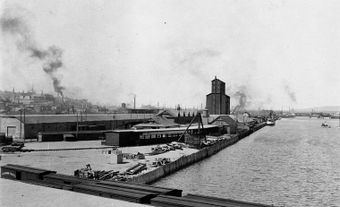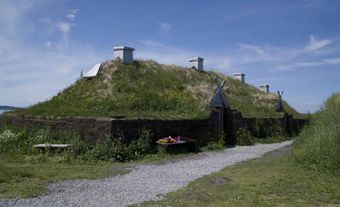Winthrop
Winthrop. An opera (in the manner of an historical pageant) by István Anhalt, recording, as stated on the title-page of the score, 'Events and Commentaries Related to the Life and Times of John Winthrop, Governor of the Massachusetts Bay Company at their emigration to New England and several times thereafter'. Completed in 1983, Winthrop is in two parts (each divided into five sections) and is two and a half hours in duration. It is scored for six solo singers, a mixed choir of 24 voices, a boys' choir, and 30 instrumentalists. The libretto was compiled by the composer from the writings of Winthrop, together with other original sources, mainly dating from the early 1600s, but also from earlier and later times.
The storyline first establishes the Suffolk, England, locality where John Winthrop was born in 1587. It next introduces young John (sung by a tenor) amidst his youthful awakenings, and in the following scene brings him together with his wife, Margaret. The fourth section is a depiction of the turbulent political, religious, and social life in Britain which led to Winthrop's emigration to North America, which is the theme of the fifth scene in which Winthrop, now (in 1628) middle-aged (and sung by a baritone, but still carrying on an internal dialogue with his youthful self represented by the tenor), debates the pros and cons of emigration, makes his decision, is elected Governor of the Massachusetts Bay Company and assembles an enthusiastic body of followers. The first part ends with the ships setting sail.
Part Two begins with Winthrop's ship on the high seas on the way to North America, the emigrants pledging to build 'A Citty upon a Hill,' and finally reaching the shores of the New World. The seventh section is a kaleidoscopic presentation of troubled events in the history of Boston between 1630 and 1636, and the emergence of Anne Hutchinson as a challenger to Winthrop's leadership. A court scene in the eighth section, with Winthrop both as the prosecutor and judge, and Hutchinson the accused, brings the opera to its dramatic and musical climax. Hutchinson is found guilty, banned from the colony, and collapses physically. Winthrop is agonized because in defending his utopia, he had to destroy another person's life. An orchestral interlude, both represents Winthrop's nightmare and also advances time to 1649, the last year of Winthrop's life. In the final scene old Winthrop (now sung by a bass, although the two younger voices also maintain their presence) takes stock of his life's successes and failures, and before dying reiterates his beliefs concerning liberty and personal freedom. Paeans are sung in his honour, and auctioneers take stock of his modest belongings as the work comes to its close.
Together with La Tourangelle, Winthrop forms a diptych that explores the cultural and religious colonisation of North America in the early 17th century. The first concert performance of Winthrop took place 6 Sep 1986 in Kitchener, Ont, featuring the Kitchener-Waterloo Symphony Orchestra conducted by Raffi Armenian, with tenor Glyn Evans, baritone Theodore Baerg, and bass Giulio Kukurugya (representing the three voices of Winthrop), mezzo-soprano Carol Ann Feldstein (Margaret), soprano Rosemarie Landry (Anne Hutchinson), tenor Martin Chambers (Herald), The Elmer Iseler Singers (Voices of the Community) and the Stratford Boychoir (Children of the Community). The performance was given as part of the International Year of Canadian Music and the CBC's 50th anniversary celebrations; it was broadcast on the CBC program 'Two New Hours' 14 Sep 1986.

 Share on Facebook
Share on Facebook Share on X
Share on X Share by Email
Share by Email Share on Google Classroom
Share on Google Classroom


